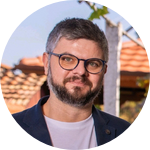About This Project
Ask the Scientists
Join The DiscussionWhat is the context of this research?
No response yet. Add response
What is the significance of this project?
No response yet. Add response
What are the goals of the project?
Meet the Team
Team Bio
We are Tsvetan and Tobias, a team of biotechnology scientists (Ph.D. level) and aspiring entrepreneurs from the University of Basel, Switzerland. Tsvetan will take the lead in project management and carry out research activities related to alkene biosynthesis. Tobias, who receives modest financial support from Switzerland to work on the enantioselective hydroxylation of volatile carboxylic acids, will support the related lab activities.
Tsvetan Kardashliev
Tsvetan holds a Ph.D. degree in protein engineering from RWTH Aachen University, Germany. He continued his specialization as a postdoctoral fellow in the field of industrial biotechnology at ETH Zurich, Switzerland. He joined the group of Prof. Thomas R. Ward at the University of Basel as a research associate in December 2022. Tsvetan boasts 10+ years of experience in working and engineering (oxidative) enzymes, fermentations, bioprocess development, and scale-up. He is also an experienced scientific project manager, an inventor with patenting and technology transfer know-how, and an aspiring entrepreneur.
LinkedIn: linkedin.com/in/tsvetan-kardashliev-b8253a1a
Google Scholar: https://scholar.google.ch/citations?user=HqJwPF8AAAAJ&hl=en&oi=ao
Project Backers
- 0Backers
- 0%Funded
- $0Total Donations
- $0Average Donation
